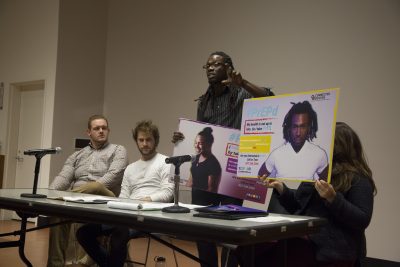
It is difficult to battle the preconceived notions volunteers often have when they are involved in community service work; but this battle is essential to creating long-lasting, shared experiences with volunteers and the communities they serve.
This idea made up the core of “Who are ‘They?,’” a panel held in the Boston University Law Auditorium on Friday. It featured four panelists working in various lines of community service who shared how privilege impacts worldview, especially when involved in community service. Giancarlo Rodriguez and Michaela Cushing-Daniels, the Community Engagement managers at BU’s Community Service Center, organized the discussion.
Despite their diverse backgrounds, each presentation hinged on one common theme: the best way to eliminate preconceived notions in spaces of service is to recognize one’s privilege and engage in open discussion with those being helped.
“The reality is that nobody has everything in common,” said Paulina Pesqueira, a match support specialist at Big Brothers Big Sisters of Massachusetts Bay, to the audience. “It all starts by sharing our vulnerability.”
The Big Brothers Big Sisters program involves matching a “little,” a child struggling to overcome life’s obstacles, with a “big,” a volunteer role model, to create a lasting, positive relationship. Pesqueira’s role in this organization is to support these matches and help create a “shared experience” for both people involved.
All four panelists stressed the importance of education as means to help generate this shared experience.
Amir Dixon, a program coordinator at the Multicultural AIDS Coalition, said during the panel that he believes it is important to create products to educate both the public and the community they are helping. The MAC’s goal is to “mobilize communities of color to end the HIV/AIDS epidemic,” according to their website, though Dixon specifically works with programs within MAC to address increased rates of HIV among gay men of color.
At the discussion, each organization representative employed teaching mechanisms designed to teach volunteers how to recognize their privilege and notice the inequalities between the lives of the community they are helping and their own lives.
Eric Seligman, Massachusetts volunteer coordinator for The Petey Greene Program, said the organization always encourages people to think about where or whom they’ve benefited from.
The Petey Greene Program, an organization that provides tutoring to incarcerated students, requires volunteers to undergo a mandatory five-hour training session in which they are taught to check their own privilege in order to help foster that shared experience with their students, said Seligman.
“[We] center the voices of our incarcerated students as much as possible,” Seligman said.
Another topic of discussion was the difficulty the organizations had addressing preconceived notions about service. One of the major issues is that people often view service as simply an opportunity to reach out to someone helpless, and not as an opportunity to help that person grow and achieve.
“[Volunteers can often] build this savior complex that makes them think that doing just a few hours of service for one day will solve everything,” Rodriguez said. “It’s extremely important to be empathetic towards this kind of thing, because the people you could be serving may not have the same social advantage as you do.”
Jay Hayston, director of Day Services at the Walnut Street Center, Inc, spoke about a similar concept during the discussion.
“You’re not there to help them do something. You’re there to help them do for themselves,” Hayston said to the audience.
The Walnut Street Center, Inc, a Somerville-based organization that provides support to people with developmental disabilities, teaches volunteers to become teachers themselves by engaging with the community in a way that fosters growth among the people being helped, Hayston said. He also added how difficult this skill is to teach, and that it can sometimes take years.
The reoccurring ideas of education and recognition of privilege were the two themes enforced during the discussion, a message that was received by audience members.
Kelly Tobin, a senior in the College of Arts and Sciences, said she thought it was easy for many to seem offensive if they didn’t recognize their privilege.
“How you see the world is not how everyone else sees the world,” Tobin said.
After the discussion, the CSC invited panelists and audience members for dinner and conversation, continuing the shared experience and sense of community from the discussion.
“I just hope that this conversation continues and they are able to share what they have learned from our panelists to others,” Rodriguez said. “The best way to create this kind of change is through dialogue, and I hope this was encouraged.”
















































































































